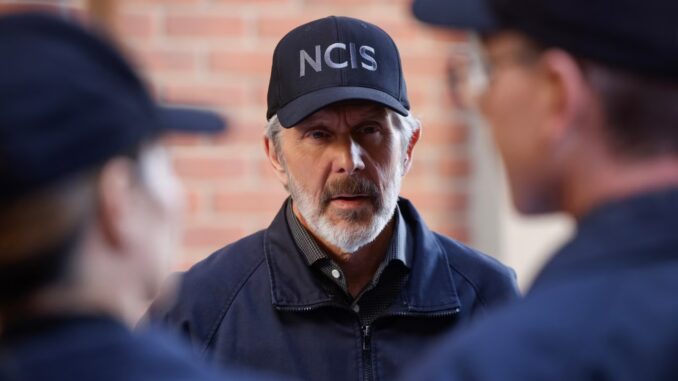
Introduction: When Fiction Mirrors Reality
When NCIS first aired in 2003, fans expected thrilling naval investigations, witty banter, and a touch of Gibbs’ no-nonsense charm. But what they didn’t realize was that some of the show’s most gripping storylines weren’t purely fiction—they were rooted in chilling real-life cases. Over the years, NCIS writers have skillfully woven true crime inspirations into episodes that blurred the line between reality and make-believe.
In this article, we’ll uncover 8 ‘NCIS’ episodes based on real cases, diving into the fascinating—and sometimes haunting—stories that brought them to life.
1. “Call of Silence” (Season 2, Episode 7) – A Veteran’s Hidden Truth
This emotional episode follows a World War II veteran who confesses to murdering his best friend decades earlier. The story mirrors real-life cases of aging soldiers haunted by wartime actions, many of whom came forward late in life to confess or seek peace.
The writers drew inspiration from true confessions made by veterans suffering from PTSD, exploring the moral and emotional complexity of guilt and redemption. It was one of the most poignant NCIS episodes ever made—showing how far the show was willing to go beyond simple procedural drama.
2. “Bloodbath” (Season 3, Episode 21) – The Stalker Within
Abby Sciuto’s life takes a terrifying turn when she becomes the target of a stalker. What many fans don’t know is that this storyline was based on real stalking incidents involving crime lab technicians and even law enforcement personnel who were targeted by criminals they helped convict.
This episode sheds light on a chilling reality: even those who work to protect others can become victims. It also showcased Abby’s vulnerability and courage, making it a standout performance by Pauley Perrette.
3. “Jet Lag” (Season 7, Episode 13) – Inspired by a Real Murder on a Flight
In “Jet Lag,” Tony and Ziva investigate a death that occurred mid-flight—a plotline inspired by actual unsolved in-flight deaths and disappearances. Real cases of people mysteriously dying or vanishing during flights have long puzzled investigators, and this episode captured that eerie sense of isolation and mystery.
The realism of the investigation—limited evidence, conflicting witness accounts, and international jurisdiction issues—mirrored real-world aviation crime challenges.
4. “Engaged” (Season 9, Episodes 8 & 9) – A Reflection of Military Tragedies
This two-part episode follows Gibbs and his team as they search for missing Marines after a plane crash in Afghanistan. It was heavily influenced by real military incidents, particularly the 2010 crash of a military transport plane that claimed the lives of several service members.
The emotional depth of “Engaged” pays tribute to the sacrifices of military families while also drawing on the tragic reality of wartime accidents and the toll they take on survivors.
5. “Shabbat Shalom” & “Shiva” (Season 10, Episodes 11–12) – Echoes of Diplomatic Tensions
These powerful back-to-back episodes focus on the death of Ziva David’s father, an Israeli diplomat—a storyline influenced by real-life political assassinations and intelligence conflicts in the Middle East.
The writers crafted the emotional fallout around themes of revenge, loyalty, and international tension, reflecting real-world diplomatic dangers faced by intelligence operatives and their families. The emotional resonance came from grounding the fictional story in genuine geopolitical events.
6. “Shell Shock” (Season 10, Episodes 6 & 7) – PTSD and the Cost of War
One of NCIS’s most realistic portrayals of trauma, “Shell Shock” was directly inspired by real U.S. Marines coping with PTSD after returning from combat. The episode focuses on a Marine who struggles with survivor’s guilt, echoing stories told by countless veterans.
The show consulted with military psychologists and veterans to ensure accuracy, resulting in one of its most respectful and honest depictions of mental health in the armed forces.
7. “Parental Guidance Suggested” (Season 12, Episode 6) – A Family Murder Inspired by True Events
This gut-wrenching episode follows the murder of a Navy officer’s wife and daughter, echoing real-life family homicide cases involving military personnel. These tragic cases often stem from the intense pressure of deployments, financial struggles, and PTSD—factors that the episode handled with sobering realism.
By grounding the story in actual psychological motivations, NCIS made it more than just another murder mystery—it became a reflection of how duty, stress, and trauma can destroy even the strongest families.

8. “Family First” (Season 13, Episode 24) – Loosely Inspired by Real Missing Person Cases
The Season 13 finale, which marks Tony DiNozzo’s emotional departure, centers around the search for a missing agent in Israel. The premise draws from real international disappearance cases, where agents or operatives vanish under mysterious circumstances.
These cases often leave families and colleagues with unanswered questions—something that NCIS captured perfectly. The episode gave fans closure while mirroring the haunting uncertainty of real-world intelligence work.
The Realism That Keeps Fans Hooked
What makes NCIS stand out after more than two decades isn’t just the action or witty dialogue—it’s the authenticity behind its stories. By weaving real-life crimes, military incidents, and emotional truths into its plots, the series maintains a depth that resonates with viewers.
Each episode reminds us that truth is often stranger than fiction, and sometimes, the most gripping stories are those pulled straight from real investigative files.
Behind the Writers’ Room: How ‘NCIS’ Incorporates Real Cases
The NCIS writing team works closely with consultants from real naval criminal investigative units, ensuring accuracy in both procedure and tone. These consultants share real experiences—minus classified details—that inspire episodes reflecting the everyday heroism and complexity of military investigations.
Writers often take small details from real case files—like a mysterious fingerprint or an unusual motive—and build entirely new stories around them, blending truth with creativity.
The Importance of Realism in Crime Drama
Why do real-life inspirations make such a difference? Because audiences crave believability. When viewers sense that an episode could happen—or did happen—they become emotionally invested. NCIS mastered this balance, grounding its drama in the everyday bravery of agents who protect national security.
In essence, the show doesn’t just entertain—it educates, honors, and humanizes those behind the badge.
Other ‘NCIS’ Episodes That Drew Real-Life Parallels
While our top eight take the spotlight, several other episodes have drawn on real-world issues:
-
“Reveille” (Season 1) touched on terrorism post-9/11.
-
“Jeopardy” (Season 3) explored procedural ethics similar to real law enforcement controversies.
-
“Homefront” (Season 13) focused on the emotional toll of domestic military life.
Even when not based on a single case, these episodes echo headlines and human experiences that make NCIS feel grounded in reality.
Why Real Cases Make ‘NCIS’ Timeless
After more than 20 years, NCIS remains one of TV’s most enduring franchises. Its ability to tap into real-world crime and emotional authenticity keeps it fresh. By drawing from the headlines, the show doesn’t just stay relevant—it stays meaningful.
It reminds us that behind every fictional story lies a grain of truth, and behind every badge, a human being with their own scars and stories.
Conclusion
NCIS may be a fictional series, but its heart beats with the pulse of reality. From episodes inspired by real military tragedies to those reflecting the struggles of everyday heroes, the show continues to prove that the truth doesn’t just inspire good television—it creates unforgettable storytelling.
The next time you watch an NCIS episode and think, “That felt real,” you might be right. Because sometimes, the line between fiction and reality isn’t just blurred—it’s erased.
FAQs
1. Are any ‘NCIS’ episodes directly based on specific real-life crimes?
Yes, several episodes—like “Call of Silence” and “Shell Shock”—draw heavily from actual military and law enforcement experiences.
2. Does the real NCIS agency help with the show’s production?
Absolutely. The real Naval Criminal Investigative Service provides consulting to ensure accuracy in procedures and storylines.
3. How realistic is ‘NCIS’ compared to real naval investigations?
While dramatized for TV, NCIS maintains a surprising level of realism, especially in how cases unfold and how agents collaborate.
4. Has any real NCIS agent ever commented on the show?
Yes, several former agents have praised the show for its respectful depiction of the agency’s mission, despite its Hollywood flair.
5. Why does ‘NCIS’ use real-life inspiration for its stories?
Drawing from real cases adds emotional authenticity, helping the show connect with audiences on a deeper, more human level.